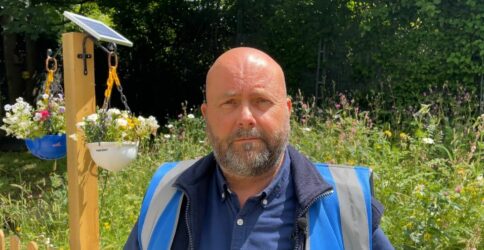Ambitious environmental targets from IEMA corporate partner Speedy Services
IEMA's Digital Journalist visited IEMA Corporate Partner Speedy Services in Milton Keynes to discuss how they are turning the company into an environmental leader with their new low carbon innovation centre.
Speedy opened their low carbon innovation centre in Milton Keynes in November 2021 and has been using the site as a demonstrator for how the business, customers and suppliers, can work towards higher environmental and sustainability standards. I visited the site and spoke with Speedy colleagues to hear what they are doing to turn the company into an environmental leader.
Speedy Hire plc (otherwise known as Speedy), according to their ESG Director Amelia Woodley, has ambitions to become “a leader in ESG [environmental, social and corporate governance], and to be one of the most sustainable organisations”. Amelia said “our vision is to inspire and innovate the future of hire” and describes sustainability as being “at the heart of our business”. They are implementing a wide-ranging program of sustainability projects, all the way from smart heating systems in their operational sites, through to spearheading the introduction of new electric commercial vehicles including the UK’s first 27-tonne truck, and the purchase of 150 electric vans for their national fleet scheduled for 2023.
The Milton Keynes site has provided Speedy with opportunities to show their suppliers and customers sustainability-focused innovation including energy-efficient building management, retrofitting, health and wellbeing initiatives, low or zero-carbon products which are being added to their hire range, and low or zero-carbon vehicles entering their fleet.
Speedy has replaced diesel fuel with HVO (hydrotreated vegetable oil) D+, which is made from 100 per cent renewable raw materials such as waste vegetables, in their tankers and HGVs across 22 Speedy locations, which will reduce carbon emissions and local air pollution.
The company is expanding its work in the sustainability space and will be publishing a new sustainability strategy soon, which will include commitments around innovation, climate, people and communities. They have already signed up to the Science-Based Targets Initiative (SBTi) and have set their near-term (2030) target for Scope 1 and Scope 2 emissions at a 50 per cent reduction on their 2019 baseline, and they are currently modelling and setting their Scope 3 target as part of their long term net-zero planning.
Please note: the views expressed in this blog are those of the contributing individual, and are not necessarily representative of the views of IEMA or any professional institutions with which IEMA is associated.
Subscribe
Subscribe to IEMA's newsletters to receive timely articles, expert opinions, event announcements, and much more, directly in your inbox.
